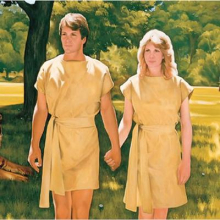One of History’s Most Shameful, Repellent and Fascinating Moments (2003)
AtlantisEmpire
Published on Dec 20, 2021
In the early 20th century, Atlanta, Georgia's capital city, underwent significant economic and social change. To serve a growing economy based on manufacturing and commerce, many people left the countryside to relocate in Atlanta, often in primitive housing. Employment conditions in the city included child labor, a 66-hour work week, low wages, and unregulated and unsafe work sites. Men from the traditional and paternalistic rural society felt it degrading that their womenfolk were forced into the city to work in factories. Mixed gender workplaces were seen as places for potential corruption.
During this same period, Southern Jews felt ambivalent about their status. Generally, they were able to economically thrive while getting along with their neighbors – the Atlanta Jewish elite was unusually assimilated into the political, economic, and social fabric of the city.[7] Despite their success, they recognized themselves as different from the Gentile majority and were uncomfortable with their image.[n 2] One of their strategies was to select rabbis and leaders who would put forth a positive image for their people and help reduce tensions between Jews and Gentiles. In Atlanta, a prominent leader from 1895 to 1946 was David Marx. To improve the image of Jews in their community, Marx's Reform temple adopted Americanized appearances. Despite his acceptance by the Gentile community, Marx believed that "in isolated instances there is no prejudice entertained for the individual Jew, but there exists wide-spread and deep seated prejudice against Jews as an entire people."
Leo Max Frank was born in Cuero, Texas on April 17, 1884 to Rudolph Frank and Rachel "Rae" Jacobs. The family moved to Brooklyn in 1884 when Leo was three months old. He attended New York City public schools and graduated from Pratt Institute in 1902. He then attended Cornell University, where he studied mechanical engineering. After graduating in 1906, he worked briefly as a draftsman and as a testing engineer.
At the invitation of his uncle Moses Frank, Leo traveled to Atlanta for two weeks in late October 1907 to meet a delegation of investors for a position with the National Pencil Company, a manufacturing plant in which Moses was a major shareholder.[14] Frank accepted the position, and traveled to Germany to study pencil manufacturing at the Eberhard Faber pencil factory. After a nine-month apprenticeship, Frank returned to the United States and began working at the National Pencil Company in August 1908. Frank became superintendent of the factory the following month, earning $180 per month plus a portion of the factory's profits.
Frank was introduced to Lucille Selig shortly after he arrived in Atlanta.[18] She came from a prominent, upper-middle class Jewish family of industrialists who, two generations earlier, had founded the first synagogue in Atlanta. Though she was less devout in her Jewish faith than Frank, they married in November 1910. Frank described his married life as happy.
In 1912, Frank was elected president of the Atlanta chapter of the B'nai B'rith, a Jewish fraternal organization. The Jewish community in Atlanta was the largest in the Southern United States, and the Franks belonged to a cultured and philanthropic social environment whose leisure pursuits included opera and bridge. Although the Southern United States was not specifically known for its antisemitism, Frank's northern culture and Jewish faith added to the sense that he was different.
During the trial, the Atlanta musician and millworker Fiddlin' John Carson wrote and performed a murder ballad entitled "Little Mary Phagan". During the mill strikes of 1914, Carson sang "Little Mary Phagan" to crowds from the Fulton County courthouse steps. His daughter, Moonshine Kate, later recorded the song. An unrecorded Carson song, "Dear Old Oak in Georgia", sentimentalizes the tree from which Leo Frank was hanged.
The Frank case has been the subject of several media adaptations. In 1921, African-American director Oscar Micheaux directed a silent race film entitled The Gunsaulus Mystery, followed by Murder in Harlem in 1935. In 1937, Mervyn LeRoy directed They Won't Forget, based on the Ward Greene novel Death in The Deep South, which was in turn inspired by the Frank case.[255] An episode of the 1964 TV series Profiles in Courage dramatized Governor John M. Slaton's decision to commute Frank's sentence. The episode starred Walter Matthau as Governor Slaton and Michael Constantine as Tom Watson.[256] The 1988 TV miniseries The Murder of Mary Phagan was broadcast on NBC, starring Jack Lemmon as Gov. John Slaton and also featuring Kevin Spacey.[257] The 1998 Broadway musical Parade won two Tony Awards.[258] In 2009, Ben Loeterman directed the documentary film The People v. Leo Frank.
https://en.wikipedia.org/wiki/Leo_Frank










